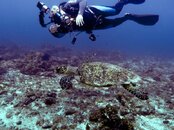R
redacted
Guest
So, how do we feel about bird feeders? How about chasing squirrels away from those feeders or raccoons out of your garden?
If you don't want to disturb marine life, stay out of the water. There is a difference between disturbing marine life and damaging or destroying it. When in doubt, go with the less impact option.
If you don't want to disturb marine life, stay out of the water. There is a difference between disturbing marine life and damaging or destroying it. When in doubt, go with the less impact option.





